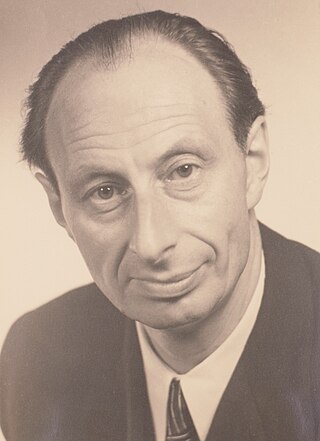
Ensemble Modern is an international ensemble dedicated to performing and promoting the music of modern composers. Formed in 1980, the group is based in Frankfurt, Germany, and made up variously of about twenty members from numerous countries.
Harry Alfred Robert Kupfer was a German opera director and academic. A long-time director at the Komische Oper Berlin, he worked at major opera houses and at festivals internationally. Trained by Walter Felsenstein, he worked in the tradition of realistic directing. At the Bayreuth Festival, he staged Wagner's Der fliegende Holländer in 1978 and Der Ring des Nibelungen in 1988. At the Salzburg Festival, he directed the premiere of Penderecki's Die schwarze Maske in 1986 and Der Rosenkavalier by Richard Strauss in 2014.

Tabea Zimmermann is a German violist who has performed internationally, both as a soloist and a chamber musician. She has been artist in residence of the Concertgebouw Orchestra, the Berlin Philharmonic, and the Bavarian Radio Symphony Orchestra. In 2004, Zimmermann founded the Arcanto Quartet, a string quartet that performed until 2016. Several composers have written music for her, including György Ligeti, and she has made her own version of Bartók's Viola Concerto from the composer's sketches.
Friedrich Goldmann was a German composer and conductor.
Kammersänger (male) or Kammersängerin (female) is a German honorific title for distinguished singers of opera and classical music. It literally means "chamber singer". Historically, the title was bestowed by princes or kings, when it was styled Hofkammersänger(in), where hof refers to the royal court.
Dorothea Röschmann is a German soprano. She is famous for her performances in operas by Mozart as well as Lieder.

Jörg Widmann is a German composer, conductor and clarinetist. In 2023, Widmann was the third most performed living contemporary composer in the world. Formerly a clarinet and composition professor at the University of Music Freiburg, he is composition professor at the Barenboim–Said Akademie. His most important compositions are the concert overture Con brio, the opera Babylon, an oratorio Arche, Viola Concerto, Kantate and the trumpet concerto Towards Paradise. Widmann has written musical tributes to Classical and Romantic composers. He was awarded the Bavarian Maximilian Order for Science and Art in 2018 and the Bach Prize of the Free and Hanseatic City of Hamburg in 2023. He was Gewandhaus Composer of the Gewandhaus Orchester Leipzig and Composer in Residence for the Berlin Philharmonic.

Opernwelt is a monthly German magazine for opera, operetta and ballet. It includes news about current performances, portraits of composers and performers, articles about opera houses, performance spaces, and contemporary and historical subjects from the world of opera and classical music. It reviews recordings and books and publishes monthly schedules of German and international opera houses. The magazine's website offers full text search for past issues. A year book is published every October.
Sebastian Weigle is a German conductor and horn player. He is currently principal conductor of the Yomiuri Nippon Symphony Orchestra.
The Schneider-Schott Music Prize is a cash award bestowed to an outstanding composer, performing artist, or music ensemble in classical music—with emphasis, but not mandatory, on contemporary music. From 1986 to 2006, the prize was awarded annually, and thereafter, biennially. The prize is alternately given to a composer and an interpreter. The award ceremony is traditionally associated with a concert by the award winner.
Wolfgang Katschner is a German lutenist and conductor. He is director of the ensembles Capella Angelica and Lautten Compagney which specialise in Baroque music—notably the operas of Handel.

Carolin Widmann is a German classical violinist. She focuses on contemporary music. Widmann plays a violin made in 1782 by Giovanni Battista Guadagnini.
Vera Nemirova is a Bulgarian-German opera director who has worked at major opera houses in Europe, staging for example Wagner's Der Ring des Nibelungen at the Oper Frankfurt. She directed for the Munich Biennale and the Salzburg Festival.
Rolf Reuter was a German conductor.
Corinna von Rad is a German-American opera and theatre director.

Benedikt Kristjánsson is an Icelandic operatic and concert tenor who is based in Germany and has appeared internationally. He focuses on Baroque music, especially by Johann Sebastian Bach, but has also performed and recorded Romantic lieder and contemporary music. He has performed Bach's St John Passion in an arrangement for one singer, keyboard and percussion, notably in a live broadcast from Bach's resting place at the Thomaskirche on Good Friday 2020.
Uta Priew is a German operatic mezzo-soprano.

Helmut Koch was a German conductor, choir leader, composer, and academic teacher. He was recording manager for the Berliner Rundfunk from 1945, where he founded the Solistenvereinigung Berlin, the Kammerorchester Berlin and the Großer Chor des Berliner Rundfunks. He conducted a recording of Monteverdi's L'Orfeo in 1949, and later also contemporary classical music by composers including Hanns Eisler, Fritz Geißler, Ernst Hermann Meyer and Ruth Zechlin. He was professor at the Hochschule für Musik "Hanns Eisler" from its beginning. After working as a regular guest conductor at the Staatsoper Berlin, he became Generalmusikdirektor. He was the first conductor of the Berliner Singakademie in East Berlin, and held the position until his death.
Gustav Schmahl was a German violinist and university lecturer. He was the only student of David Oistrach from the GDR. Schmahl worked at times as concertmaster of the Rundfunk-Sinfonieorchester Berlin and from 1973 to 1984 as rector of the University of Music and Theatre Leipzig.
Helmut Branny is a German conductor, double bassist and professor of chamber music at the Hochschule für Musik Carl Maria von Weber Dresden. He is a member of the Sächsische Staatskapelle Dresden, musical director of the Dresdner Kapellsolisten and the Cappella Musica Dresden. With the Kapellsolisten, he has made many recordings, and toured internationally.







